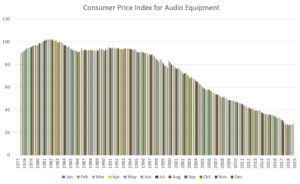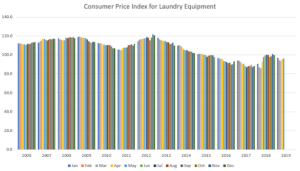
Anecdotes are not necessarily useful to understand the social and economic world. An anecdote based on a sample of one can be worse than useless. A related point: we don’t expect a plumber to be able to criticize the mechanics of fluids; and we don’t expect a businessman to successfully challenge the economics of international trade. Jean-Baptiste Say, author of the 1803 Treatise on Political Economy, was an exception, and he wrote a whole treatise to prove it.
Brian Tedesco, the owner of an unidentified “consumer-electronics sales and distributing company,” wrote an op-ed in the Wall Street Journal of June 30, where he boasts that his customers did not pay the 25% tariff on the goods he imports from China. He says he has “a different perspective,” and that he was able to get from his Chinese suppliers a price reduction that covered most of the tariff.
Exceptions, of course, are not impossible, but they may represent the impact of other economic factors. Mr. Tedesco only gives one example: Bluetooth speakers. I don’t have data on this specific product, but I looked at the audio equipment category of the Consumer Price Index. The data, available from the Labor Department, are reproduced below.

Since these data cover a wider category than Bluetooth speakers, they do not permit a precise analysis of the market which Mr. Tedesco claims to illustrate. But they do show something remarkable. The price of consumer audio equipment on the American market dropped continuously for a quarter of a century, from the mid-1990s up to 2017. Then, starting roughly with the Trump administration’s trade war, the price suddenly plateaued in 2018 and started ticking upward in 2019.
Virtually everywhere we look, we get the picture of the American consumer absorbing all US government tariffs in higher prices, as economic trade theory predicts (except in rather exceptional situations).
Consider another example: the tariffs on washing machines imposed by the Trump administration at the end of January 2018. The chart below shows the whole price series available for the CPI category of laundry equipment, which also includes dryers. After a first wave of temporary tariffs on washing machines from South Korea and Mexico in 2012, the price of consumers’ laundry equipment dropped continuously. The little price uptick in 2016 is due to a temporary tariff on washing machines imported from China. (See Aaron Flaaen et al., “The Production Relocation and Price Effects of U.S. Trade Policy: The Case of Washing Machines,” Becker Friedman Institute, April 18, 2009.) The 2018 Trump tariff hit all imports of washing machines, and its impact is quite visible on the chart.

It’s important to understand that the actual price impact of a tariff is the current price minus what the price would have been, ceteris paribus, without the tariff. (Note also that a tariff hits only the cost of the actual imports, excluding the value subsequently added by domestic transportation and marketing, for example.) In the case of audio and laundry equipment, the ceteris paribus would likely have been the continuation of the long-term price decline.
More sophisticated econometric studies, which try to incorporate the non-tariff counterfactual, are useful to obtain better estimates. For example, a paper by Mary Amiti et al., “The Impact of the 2018 Trade War on U.S. Prices and Welfare” (NBER, March 2019), which studies the impact of the six waves of tariffs in Trump’s trade war (before the increase of Chinese tariffs to 25% in May), concludes:
We find that the U.S. tariffs were almost completely passed through into U.S. domestic prices, so that the entire incidence of the tariffs fell on domestic consumers and importers up to now, with no impact so far on the prices received by foreign exporters. We also find that U.S. producers responded to reduced import competition by raising their prices.

READER COMMENTS
Andre
Jul 9 2019 at 8:34am
“so that the entire incidence of the tariffs fell on domestic consumers and importers up to now”
How has the mix of domestic vs. imported machines shifted? Intuitively, even if foreign exporters are receiving the same prices, with the tariff falling on domestic consumers, one would expect there to be a shift in the market from imported to domestic machines.
Which was a key consideration to begin with, no?
Jon Murphy
Jul 9 2019 at 9:38am
There has been a shift from imported to domestic, which is subsequently why the tariff falls on consumers, consumer welfare falls, and the nation is worse off on the whole.
Thaomas
Jul 9 2019 at 10:29am
Indeed, if there were NO shift towards domestic production, there would be no economic cost to the measure, just an income transfer from consumer to government. (OK there would still be an economic cost if the higher price of the tariffed item let to substitution of other items in the consumption basket.)
Jon Murphy
Jul 9 2019 at 10:33am
Incorrect. There are always costs. What you mean to say is there is no deadweight loss to measure (assuming a world of no transaction costs).
Pierre Lemieux
Jul 9 2019 at 10:14am
This is what seems to have happened. Flaaen et al. wrote (their paper was published in April 2019):
Bill T
Jul 9 2019 at 9:31am
Looking at the CPI for audio, I see that the price declined steadily until 2017. At that point it took a jump down. The plateau you talk about then occurred. Looking at the data I would guess that the last date of the plateau is still below a linear least squares fit of the price data starting at 2000 (this is especially true if you fit an exponential decay curve).
For the Laundry graph the jump upward is no greater than the increase seen between 2010 and 2011. Is there some explanation for that increase?
I don’t doubt your thesis (you know a lot more about economics than I do), but I’m not sure that the data shown supports it.
Pierre Lemieux
Jul 10 2019 at 11:39am
Bill: Remember that, because of the imprecise data I am using, my charts are more illustrative than conclusive. They illustrate that something happened with the Trump trade war that stopped a long trend (a quarter of a century in the case of audio equipment), in a way consistent with what standard economic theory predicts: tariffs are added to consumer prices in the country whose state imposes them. We find these illustrations everywhere. A formal demonstration requires an econometric study of the sort that Amiti et al. did.
Jon Murphy
Jul 9 2019 at 10:32am
There is something else important to note, something that undermines almost all of the Administrations talking points on trade:
Mr. Tedesco’s story highlights the fact that individuals, not nations or governments, trade. Mr. Tedesco was able to work with his suppliers. It wasn’t “America” or “Trump” negotiating. It was Mr. Tedesco negotiating with whoever is his supplier.
robc
Jul 9 2019 at 2:12pm
Also, if Mr Tedesco was able to negotiate a 20% or so reduction in cost to mostly offset the tariff, why could he have not negotiated the same reduction without the tariff?
Pierre Lemieux
Jul 9 2019 at 4:43pm
robc: You’re right.
Benjamin Cole
Jul 10 2019 at 2:16am
“We find that the U.S. tariffs were almost completely passed through into U.S. domestic prices, so that the entire incidence of the tariffs fell on domestic consumers and importers up to now, with no impact so far on the prices received by foreign exporters.”–as quoted by PL.
Other studies show Sino exporters eating the tariffs.
Theory suggests who eats the tariffs depends upon the elasticity of supply and demand.
It seems like a PC result to find the tariffs were entirely borne in the US, or in China.
Some Berkeley researchers recently did a meta-study and found the minimum wage does not affect employment of lo-w-wage workers. Yes, they were from Berkeley.
I am beginning to suspect that researchers write their abstracts first, and then conduct the “study.”
Pierre Lemieux
Jul 10 2019 at 11:46am
Can you cite them? Can you compare them (or it, if there is only one) with the quality of the studies I have been citing in this post and others?
Pierre Lemieux
Jul 10 2019 at 12:31pm
I am of course not denying that value judgments (what people should do) can bias the economic analyst. We should strive to avoid this in positive analysis (what people do). As far as policy proposals are concerned, value judgments are unavoidable (as welfare economics has shown). Example: Is it better that 1.3 million Americans not be coercively thrown out of the labor market or that 17 million get an increase of $5 an hour? Hopefully, value judgments are stated clearly and are applied to the conclusion of the analysis instead of at its beginning. In a 40th-anniversary review of James Buchanan’s What Should Economists Do? for the forthcoming issue of Regulation (Fall 2019), I mention these issues.
Mark Brady
Jul 9 2019 at 2:14pm
What is the impact of the tariff on the wages of Chinese workers? Now there’s a question that doesn’t get asked in the U.S., or discussed on EconLog!
Pierre Lemieux
Jul 9 2019 at 4:49pm
You’re right, Mark. By restraining the imports of its own citizens, the US government is also imposing a cost on Chinese producers (and shareholders in Chinese companies), just like Chinese retaliation imposes one on American producers. Your comment reminds me of what John Hicks wrote:
KARL
Jul 11 2019 at 11:25am
Dear Pierre
First of all , I don’t understand why Brian Tedesco pre-pays anything to the Chinese. We have been buying High value metals and chemicals for more than 20 years from various Chinese producers, and we NEVER ever pre-pay to the Chinese.
I also agree with you that the American Importer , like our company, pays the full 25 % tariff despite what Peter Navarro says
One of my customers , however , helped us by having us ship to their Korean facility . Thus we did not have to pay the Tariff , but their American workers did not get the work here in the U.S.
While what Trump is attempting to achieve is admirable , I do not see the Chinese accepting his demands
Moreover , while I generally support Trump , his un-predicability has resulted in American companies freezing their future plans. The danger is that Trump will self-destruct and undo all stimulus of last year.
Pierre Lemieux
Jul 14 2019 at 12:43am
Thanks for this comment, Karl.
Comments are closed.